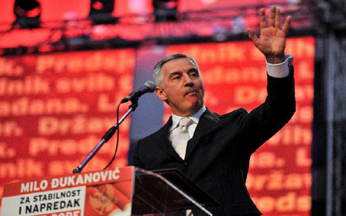PODGORICA, Montenegro, April 13, 2018 (BSS/AFP) – Gangland killings and organised crime have loomed over Montenegro’s presidential campaign, handing ammunition to the opposition in their attacks on six-time former prime minister Milo Djukanovic, who is the favourite to win Sunday’s first round vote.
Having dominated politics in the tiny Balkan nation for nearly a quarter of a century, Djukanovic, 56, stepped down as prime minister in October 2016, before announcing his comeback bid last month.
The pro-western veteran leader wants to take the predominantly Orthodox country, a part of which has strong pro-Russia sympathies, into the European Union following its admission to NATO in 2017 which Moscow strongly opposed.
If he wins the presidency, currently a ceremonial post held by Filip Vujanovic, it is expected to become the real seat of power in the country of 620,000 people.
The issue of organised crime has cast a shadow on the campaign, with some 20 people killed by assassinations in the street or car bombs over the last two years.
The country’s police chief Slavko Stojanovic and the head of the capital Podgorica’s department, Jovica Recevic, both resigned earlier this month.
– ‘Creator of chaos’ –
The opposition has tried to take advantage of the turmoil and accuses Djukanovic of being linked to the mafia, which he denies.
“As president, I will do everything in my power… to give the police the authority that would allow them to protect citizens from those who put their lives in danger,” Djukanovic, who has also served one term as president, said during the campaign.
Mladen Bojanic, who has the support of most opposition parties, including pro-Russian factions, poured scorn on the comments.
“He cannot be the solution because he is the creator of the instability and chaos that we witness in the streets of Montenegro,” said Bojanic, who is expected to secure a third of the vote.
“I agree with Djukanovic that the state is stronger than mafia. But the problem is that I do not know which side he is on.”
– Decline of Russian influence –
Another candidate, pro-Russian Marko Milacic, accuses Djukanovic of being most responsible for the “situation in the country, from bloody streets to the foreign policy and a ruined economy”.
With Montenegro’s average salary at around 500 euros ($615) and unemployment at over 20 percent, the debate between the West and Russia is not the main concern of many Montenegrins.
“These people and their programmes are worn out. Nobody proposes solutions to our real problems, the fall in the standard of living, unemployment, young people leaving to go abroad,” said Milan, a 23-year old student who did not want to give his last name.
For Djukanovic, however, the choice between Brussels and Moscow is crucial to whether Montenegro will “remain on its road of development”.
Along with Serbia, Montenegro is the favourite to join the EU next, possibly as early as 2025.
The EU in its 2016 country progress report told Montenegro it should continue its efforts to reduce organised crime, in particular on human trafficking and money laundering, and also noted the problem of international cigarette smuggling through the port of Bar.
The EU unveiled its new eastward expansion strategy in February, presenting the prospect of membership as an incentive for reform in the Balkans region.
All candidate countries are strongly encouraged to align their foreign policy with the EU, including regarding Russia.
Montenegro’s parliamentary elections in 2016 were marred by the arrest of around 20 anti-NATO supporters that authorities accused of attempting to foment a coup.
But this time around the “Russian influence is less present and has no possibility of determining the result of the elections,” said Zlatko Vujovic, head of the independent (CEMI) body that will monitor Sunday’s vote.
Vujovic said he believes that Djukanovic is the “clear favourite”.
If the veteran leader is forced into a run-off, it will be held on April 29.



